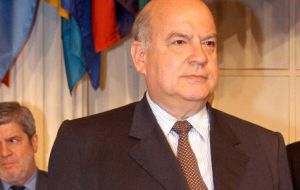MercoPress. South Atlantic News Agency
On inaugurating second term Insulza calls for a “genuinely multilateral OAS”
 Jose Miguel Insulza defended the role of OAS
Jose Miguel Insulza defended the role of OAS The Secretary General of the Organization of American States (OAS), José Miguel Insulza, said upon taking office for his second term at a special session of the Permanent Council that “those who seek to show an inactive OAS must face the reality of an always present OAS, and those who accuse the OAS of complicity or partiality end up giving examples of the OAS at a different time, for lack of evidence of any instance of partiality during this period”.
Re-elected by acclamation for the period 2010-2015 in an election held March 24, Insulza described in a speech Monday morning delivered in the Hall of the Americas the main goals for his new term, reiterating the convictions that will guide his leadership.
He also highlighted the achievements of the Organization in the last five years, defending the growing role of the top hemispheric organization in the region.
Among the successes of his first term, the top OAS official mentioned the effective role of the Organization in nearly a dozen political crises in the continent, as well as the observation of more than fifty electoral processes, asserting that “nobody can in good faith affirm that the OAS in these years has failed in having, in all of these events, a conciliatory and unifying attitude”.
In this context, Insulza renewed his commitment to what he called “the three basic pillars of OAS activity: democracy and human rights, integral development and multidimensional security, and the aspects most relevant to the people of the continent.”
With respect to the new five-year period that now begins, Secretary General Insulza reiterated his wish to have “a genuinely multilateral OAS, built by all of us jointly on the basis of common principles,” and he traced five lines of work for his new mandate: to develop a broad, modern and inclusive multilateralism; to increase support for democratic governance by promoting areas such as respect for the rule of law and institutions; to improve the balance between the tasks of democracy building and those of promoting integral development; to continue prioritizing subjects relative to public security, drug trafficking, money laundering, organized crime, arms trafficking and human trafficking; to give greater momentum to the subject of gender at the OAS.
Secretary General Insulza said those are the convictions that will guide his initiatives during his second term of office and affirmed that though “democracy makes progress in the Americas,” there are threats “that are the result of her worst failings.” Among these, he named the inability of many governments to generate adequate economic growth, reduce poverty, govern efficiently and avoid the rise of drug trafficking and organized crime. Nevertheless, he affirmed that “there is no doubt that the countries of our region are looking for better ways to act jointly,” and he reaffirmed his conviction that “there is an important space for multilateralism and for hemispheric multilateralism” that “is necessary.”
To face the problems of the continent in a collaborative way is possible “if we all accept in good faith three principles that form the basis of our regional understanding,” he said: common adherence to the fundamental values expressed in our Inter-American Democratic Charter; full acceptance of the principle of non intervention, consecrated in the Charter of the Organization; and the conviction that as a matter of principle there must be room in the OAS for all its members, which are, according to the Charter, all the independent countries of the Americas.
Upon concluding, the OAS Secretary General referred to the financial problems of the Organization. “What the OAS receives is not enough to meet all the mandates that its own Member States have assigned to it,” he indicated. “The dilemma is clear: to raise contributions or reduce mandates,” he said.
“It is possible that the ideologies in vogue in past decades that assigned little relevance or even negative relevance to the political aspect may have contributed to the casting aside of this essentially political hemispheric organization to transfer resources to other organizations. Today, when there is room for the need for politics, for the call to strengthen democracy, the implementation of public policy, maybe this is the time to strengthen the OAS. I hope that our leaders see it this way,” Insulza concluded.




Top Comments
Disclaimer & comment rulesCommenting for this story is now closed.
If you have a Facebook account, become a fan and comment on our Facebook Page!